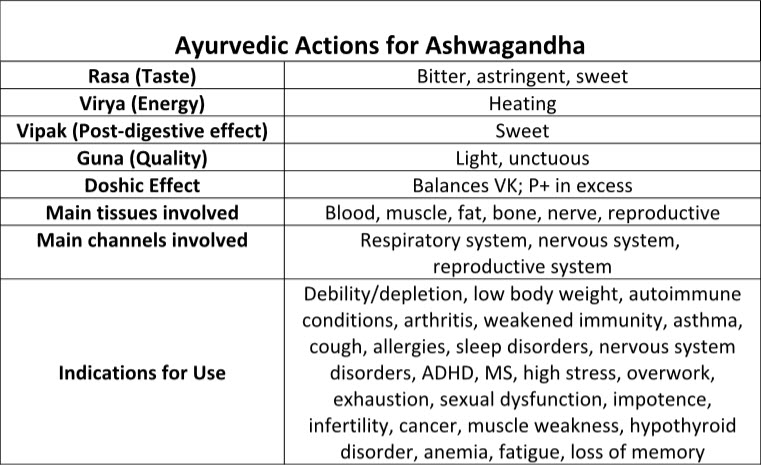 Ashwagandha has been called the “Indian Ginseng” of Ayurveda, and for much good reason. This starchy root is quite possibly the number one tonic for the nervous system, reproductive system and muscles. In a society of constant “go, go, go!”, Ashwagandha is definitely one of my most prescribed herbs that I use in my healthcare practice.
Ashwagandha has been called the “Indian Ginseng” of Ayurveda, and for much good reason. This starchy root is quite possibly the number one tonic for the nervous system, reproductive system and muscles. In a society of constant “go, go, go!”, Ashwagandha is definitely one of my most prescribed herbs that I use in my healthcare practice.
Ashwagandha is known as an adaptagen in herbal medicine, meaning that it has the ability to adapt the body to physical, environmental and emotional stress. Ashwagandha also carries the ability to balance the immune system; making this a great herbal choice for both weaken immunity, as well as autoimmune disorders (overactive immunity).
Ashwagandha is referred to as a rasayana or rejuvenative tonic in Ayurvedic medicine. This powerful root is known to rejuvenate and strengthen the tissues, making ashwagandha a great choice for muscle weakness and overall depletion. Ashwagandha is mainly used for Vata imbalances, as it is building and nourishing by nature. It is a great herb to take during times of overwork, exhaustion, stress and sexual debility.
Ashwagandha Health Benefits
- Useful in all Vata disorders
- Increases energy, strength and vitality
- Enhances the intellect, memory and concentration
- Used in rejuvenation therapy
- Anti-aging
- Strengthens and repairs muscle tissue
- Promotes sound sleep and relaxation
- Reduces stress
- Increases the libido and fertility
- Reduces pain and inflammation
- Useful in arthritic conditions
- Strengthens and nourishes the nervous system
- Used in nervous system disorders such as MS, ADHD, hyperactive disorders and nervous exhaustion
- Benefits asthma, allergies and cough
- Useful in lowered immunity
- Useful in autoimmune disorders
- Possesses anti-tumor properties
- Benefits anemia
- Useful in physical and mental exhaustion
- Regenerates hormones
- Helps to heal wounds and sores
How to Use Ashwagandha
Ashwagandha, like all herbs, can be taken in many different ways depending on the needs of the individual. Here are a couple ways to incorporate Ashwagandha into your daily routine:
1. General Ashwagandha Remedy
Take 1/2 tsp of Ashwagandha in 1/2 cup of warm water. Take this three times daily, after meals.
2. Ashwagandha Milk for Sleep
Boil one cup of milk** and remove from heat. Add 1 tsp of Ashwagandha and a large pinch of nutmeg. Once the heat has reduced a bit, add honey to taste. Stir thoroughly. Take this each night 30 minutes before bed to induce a sound, restful sleep.
**Organic whole milk is the best option, but almond or hemp milk can be substituted as needed.
3. Ashwagandha for Strength, Energy and Rejuvenation
Take 1/2 tsp of Ashwagandha and mix in 1 tsp of honey and 1/2 tsp of ghee. Wash down with warm water. Take this two times daily; first thing in the morning and again around 2-3pm.




Many say ashwagandha is not good for autoimmune disease like hashimotos thyroiditis. But u have adviced ashwagandha instead. Is it really good for autoimmune disease?
Hi Laxmi! Thank you for taking the time to read my article:) That is a really great question, as I have read both that Ashwagandha should be avoided for increased immunity (aka autoimmune conditions), but I have also learned otherwise. The reason I have learned it is beneficial to use ashwagandha for autoimmune conditions is because its adaptogenic properties. These allow it to have the ability to increase immunity in times of depletion, while suppressing it during times of increased immunity. There are several other Ayurvedic herbs such as Guduchi that also possess this ability; whereas any herbs that are strictly used for increased immunity, you would definitely want to avoid altogether. I hope this helps to answer your question. Please let me know if any more arise! Namaste…
Is ashawgandha beneficial for person suffering from systemic sclerosis??
Hi Mani! Thank you for your question. Ashwagandha is said to be beneficial in autoimmune conditions as it regulates the white blood cell count (whether low or high). However, systemic sclerosis is a serious disorder and therefore I hesitate to ever give general advice in more serious conditions. For this I would feel more comfortable in a consultation setting in which I can gather more specific information on your individual case. I apologize that I cannot be more helpful… Namaste, Danielle
Hii Danielle …Can ashwagandha be taken in alopecia aretea(hair loss from scalp and body) as it is also a auto immune disorder.
Regards
Hi Rahul,
Thanks for the question! This is a debatable subject but from my studies I have learned that Ashwagandha is immunomodulator meaning it regulates the immune system rather than simply increasing immunity. This makes it quite beneficial in autoimmune disorders. Another good herb for this is Guduchi. These can both be taken for most autoimmune conditions including Alopecia. Of course in order to find out the best dosages and administration of these herbs, it is always best to find a trusted practitioner to work under. Hope this helps!
Namaste,
Danielle
Hello Danielle. How about Parkinson’s? Thank you.
Hi Serzh! Thanks for writing in. Ashwagandha will be useful in Parkinson’s, as it is great for nourishing and strengthening the nervous system. However, the main herb used in Parkinson’s is known as Kapi Kachu as it contains a precursor for dopamine. This herb is often paired with Gokshura in order to make this action more potent. You can find all of these herbs in my Majja Ghrita formula. Please let me know if you have any further questions!
Namaste,
Danielle